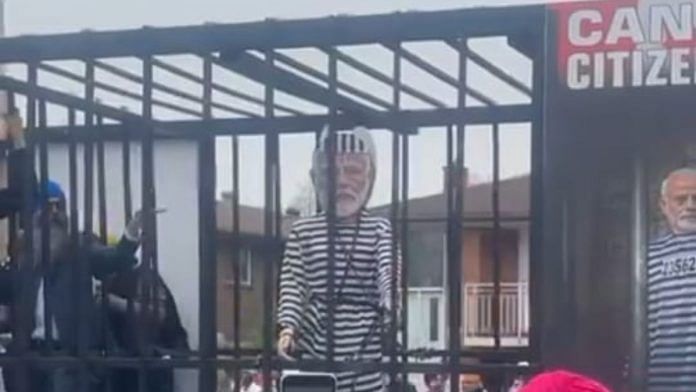New Delhi: India sharply condemned Canada Tuesday for providing a safe space to “criminal and secessionist elements” within its borders, a day after a float, depicting Prime Minister Narendra Modi as a prisoner, featured in a Sikh procession in Toronto.
This comes amid strained ties between New Delhi and Ottawa after Canadian police arrested three Indian nationals in the matter of the killing of Sikh separatist Hardeep Singh Nijjar in British Columbia — the death that has sparked a diplomatic row between the two countries since last year.
India is awaiting details about the arrests, External Affairs Minister S. Jaishankar said Saturday, adding that the suspects were from a “gang background”.
“We have repeatedly raised our strong concerns regarding the violent imagery being used by extremist elements in Canada against our political leadership. Celebration and glorification of violence should not be a part of any civilised society,” Ministry of External Affairs (MEA) spokesperson Randhir Jaiswal said in a statement.
On Monday, a depiction of PM Modi in a prisoner’s jumpsuit behind bars under a banner that read, “Canada’s Citizen Court”, was made at a nagar kirtan held by Sikhs in Malton, Toronto. The participants are believed to have held PM Modi accountable for Nijjar’s death.
“We again call upon the Government of Canada to stop providing criminal and secessionist elements a safe haven and political space in Canada,” the MEA statement noted.
This comes almost a year after a tableau featured in a parade in Brampton depicted the assassination of former Prime Minister Indira Gandhi. On 4 June last year, members of the Sikh community held a parade to mark the 39th anniversary of Operation Blue Star, which saw the Indian armed forces storm the Golden Temple where Sikh extremist Jarnail Singh Bhindranwale and his followers were present.
External Affairs Minister S. Jaishankar had criticised the demonstration at the Brampton parade and accused Canadian authorities of giving space to “radical” elements.
In its latest statement, the MEA cited the Indira Gandhi tableau last year, and posters displaying death threats against Indian diplomats stationed in Canada.
“Display of posters of Indian diplomats have also been put out across Canada threatening violence against them. We continue to remain concerned about the security of our diplomatic representatives in Canada,” the ministry added.
Indo-Canadian ties have been strained since Canada’s Prime Minister Justin Trudeau alleged that Indian agents played a role in Nijjar’s assassination. India has repeatedly denied the claims and cancelled diplomatic immunity for 41 Canadian diplomats.
Meanwhile, US officials are investigating the potential role of Indian agents in a foiled assassination plot against Sikh separatist Gurpatwant Singh Pannun on American soil. Recent reports alleged that former Research and Analysis Wing (RAW) chief Samant Goel and other top officials were part of the failed attempt.
Apart from the Nijjar case, relations between India and Canada have also soured over a public inquiry in Canada that alleged, in an interim report last week, that Indian officials have sought to influence Canadian communities and politicians to “align” Ottawa’s position with New Delhi’s interests on key issues like Sikh separatism. The report released Saturday further claims that the “targets” of Indian foreign interference are often members of Indo-Canadian communities.
In its latest reaction to the controversial float in Toronto, India said that countries should not “allow intimidation by radical elements in the name of freedom of expression”.
(Edited by Mannat Chugh)
Also read: China can’t take India’s rise as a middle power. So it’s blaming heightened tensions on US



